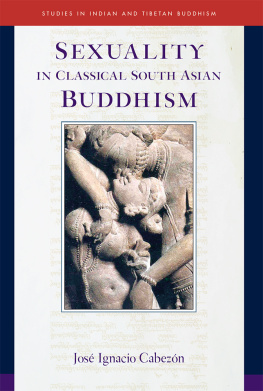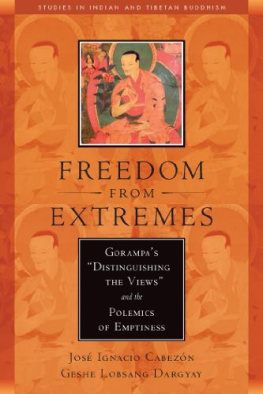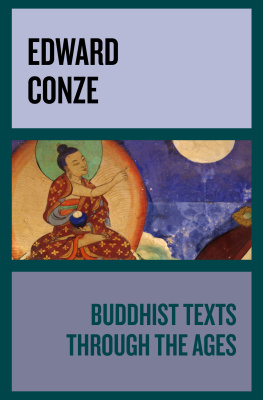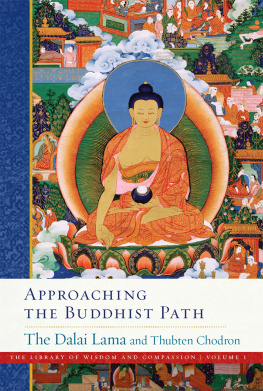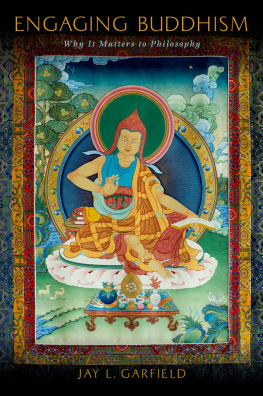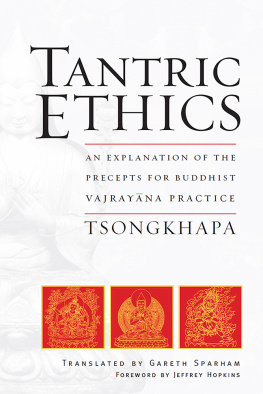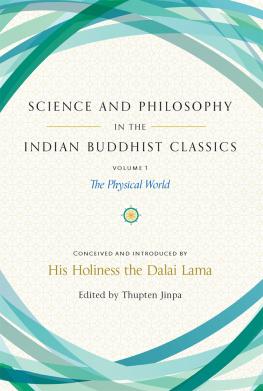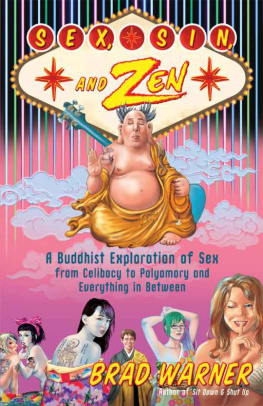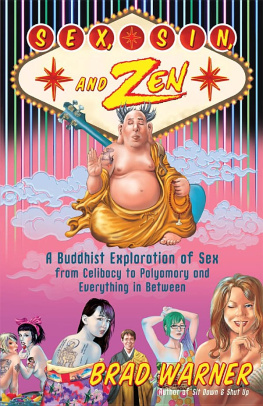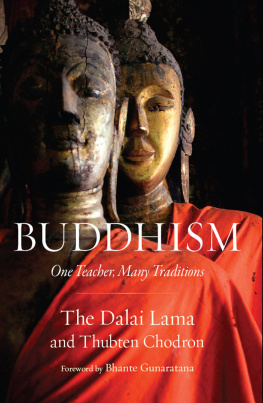Studies in Indian and Tibetan Buddhism
THIS SERIES WAS CONCEIVED to provide a forum for publishing outstanding new contributions to scholarship on Indian and Tibetan Buddhism and also to make accessible seminal research not widely known outside a narrow specialist audience, including translations of appropriate monographs and col- lections of articles from other languages. The series strives to shed light on the Indic Buddhist traditions by exposing them to historical-critical inquiry, illuminating through contextualization and analysis these traditions unique heritage and the significance of their contribution to the worlds religious and philosophical achievements.
Members of the Editorial Board:
Tom Tillemans (co-chair), Emeritus, University of Lausanne
Jos Cabezn (co-chair), University of California, Santa Barbara
Georges Dreyfus, Williams College, Massachusetts
Janet Gyatso, Harvard University
Paul Harrison, Stanford University
Toni Huber, Humboldt University, Berlin
Shoryu Katsura, Ryukoku University, Kyoto
Thupten Jinpa Langri, Institute of Tibetan Classics, Montreal
Frank Reynolds, Emeritus, University of Chicago
Cristina Scherrer-Schaub, University of Lausanne
Ernst Steinkellner, Emeritus, University of Vienna
Leonard van der Kuijp, Harvard University

An extraordinary book, simultaneously a monument of deep, detailed South Asian philological scholarship and a sourcebook entirely accessible to a broader gender-studies readership. There is nothing remotely like it.
WENDY DONIGER, University of Chicago
Over a distinguished career, Jos Cabezn has produced a range of studies that have enriched and broadened our knowledge of the Buddhist tradition. Here, in what will be regarded as his most important work, he masterfully explores the multiple worlds of Buddhist sexuality. A learned combination of compendium and critique, this book immediately becomes the standard work to which all readers will turn.
DONALD S. LOPEZ JR., University of Michigan
A tour de force! The book bravely engages its subject in a way that prevents us from imposing our contemporary understandings of sexuality onto ancient ideas while also analyzing what Buddhist texts can offer to modern-day conversations on such themes as the purpose and origins of sex, the nature of sexual desire, gender and biological sex, sexual deviance, sexual ethics, celibacy, and much more.
SARA L. MCCLINTOCK, Emory University
The fruit of decades of engagement, study, and reflection, Jos Cabezns Sexuality in Classical South Asian Buddhism is a stunning achievement. It not only opens up the world of traditional Indian Buddhist ideas about gender, sexuality, and sexual practices in greater depth than any work before it, it has much to say as well about our contemporary struggles with these intimate, universal human issues. Ambitious, erudite, humane, and utterly captivating, Sexuality in Classical South Asian Buddhism is a monumental contribution to Buddhist studies, Asian studies, studies in gender and sexuality, and cultural studies, sure to be the standard work on the topic for many, many years to come.
ROGER R. JACKSON, Carleton College
Illustrations
Introduction
What good are the scriptures to a man who has no sense of his own?
Of what use is a mirror to someone who is blind?
Cakya, Ntistra (10.9)
The fact that there is a textual warrant for something is no reason to accept it. Although what the texts say may be true in general, everything depends on social context... Therefore accept or reject something only after you have taken into account the place, the time, what the texts say, and your own self-nature.
Vtsyyana, Kmastra (2.9.41)
O N A WARM June day in 1997 I walked into the Fairmont Hotel in San Francisco to attend a meeting with His Holiness the Dalai Lama. A group of gay and lesbian Buddhists from the San Francisco Bay Area had requested the audience to discuss with the Dalai Lama his views on homosexuality and to ask for clarifications about statements he had made on the topic statements that some of the organizers believed to be problematic.
As the meeting began, one of the organizers recounted how she had been shunned by her family when she came out to them as a lesbian; others also shared their stories. Such personal reflections clearly moved His Holiness. When it was the Dalai Lamas turn to speak, he began by stating his strong opposition to discrimination on the basis of sexual orientation and his commitment to full human rights for lesbian, gay, bisexual, and transgender people. It is wrong for society to reject anyone on the basis of his or her sexual orientation, His Holiness said. Your movement to gain full human rights is reasonable and logical. In society at large there is nothing wrong with people engaging in mutually agreeable sexual acts... it is unacceptable for anyone to look down on gay people.
But then the discussion turned from what is and is not appropriate in society at large to what the Buddhist tradition has to say about sexuality. His Holiness opened up a Tibetan text that he had brought with him to the meeting, the Great Treatise on the Stages of the Path (Lam rim chen mo), written by the Tibetan scholar Tsongkhapa. He began to read from the section that describes sexual misconduct. Tsongkhapa states that sex between men is inappropriate, but he also proscribes masturbation, sex during the day, oral and anal sex, and much else to boot. As the Dalai Lama began to explain Tsongkhapas views on sex, the mood in the room grew palpably gloomier as the participants realized that a commitment to LGBT rights did not necessarily translate into the moral acceptability of a variety of sexual acts (both homosexual and heterosexual) that are widely considered ethically unproblematic in contemporary society. Significantly, however, the Dalai Lama did not end his remarks there. After explaining Tsongkhapas position, he went on to speak about the possibility of understanding such prohibitions in the context of their time, culture, and society. If homosexuality is part of accepted norms [today], he continued, it is possible that it may be acceptable. Who decides, however, whether it is acceptable in contemporary Buddhism? How do Buddhist ethical norms change? According to the Dalai Lama,
No single person or teacher can redefine these precepts. I myself do not have the authority to redefine them since no one can make a unilateral decision or issue a decree [on such topics]... Such a redefinition can only come out of sagha discussions among the various Buddhist traditions. It is not unprecedented in the history of Buddhism to redefine moral issues, but this has to be done at the collective level.
As the meeting came to a close, the Dalai Lama called for more research and dialogue, and he concluded by reiterating that however the Buddhist doctrine of sexual misconduct comes to be defined, it can never justify discrimination against sexual minorities.
Who speaks for the Buddhist tradition when it comes to deciding ethical matters? What role do ancient religious texts play in adjudicating questions of sexual ethics? By making reference to the words of Tsongkhapa, the Dalai Lama was signaling that texts are not irrelevant to these discussions, but rather than citing a textual authority and allowing this to be the final word, His Holiness took two further steps that moved the dialogue forward in important ways. First, he resisted being cast as the ultimate arbiter of what constitutes morally acceptable sex. The issue, he said, would have to be decided by the Buddhist community and not by appeal to the authority of any single individual himself or anyone else. It hardly needs saying that a religious leader with the Dalai Lamas power of moral suasion could have easily taken the opposite tack, choosing to issue an opinion on the matter. His decision to defer to the broader Buddhist community is therefore not insignificant. Second, the Dalai Lama modeled the type of reasons that ought to be marshaled to challenge the views found in the classical texts. At one point, to illustrate what such an argument might look like, he took the example of prostitution. Sex for pay is permissible according to most classical Indian and Tibetan Buddhist thinkers, who claim that this does
Next page
